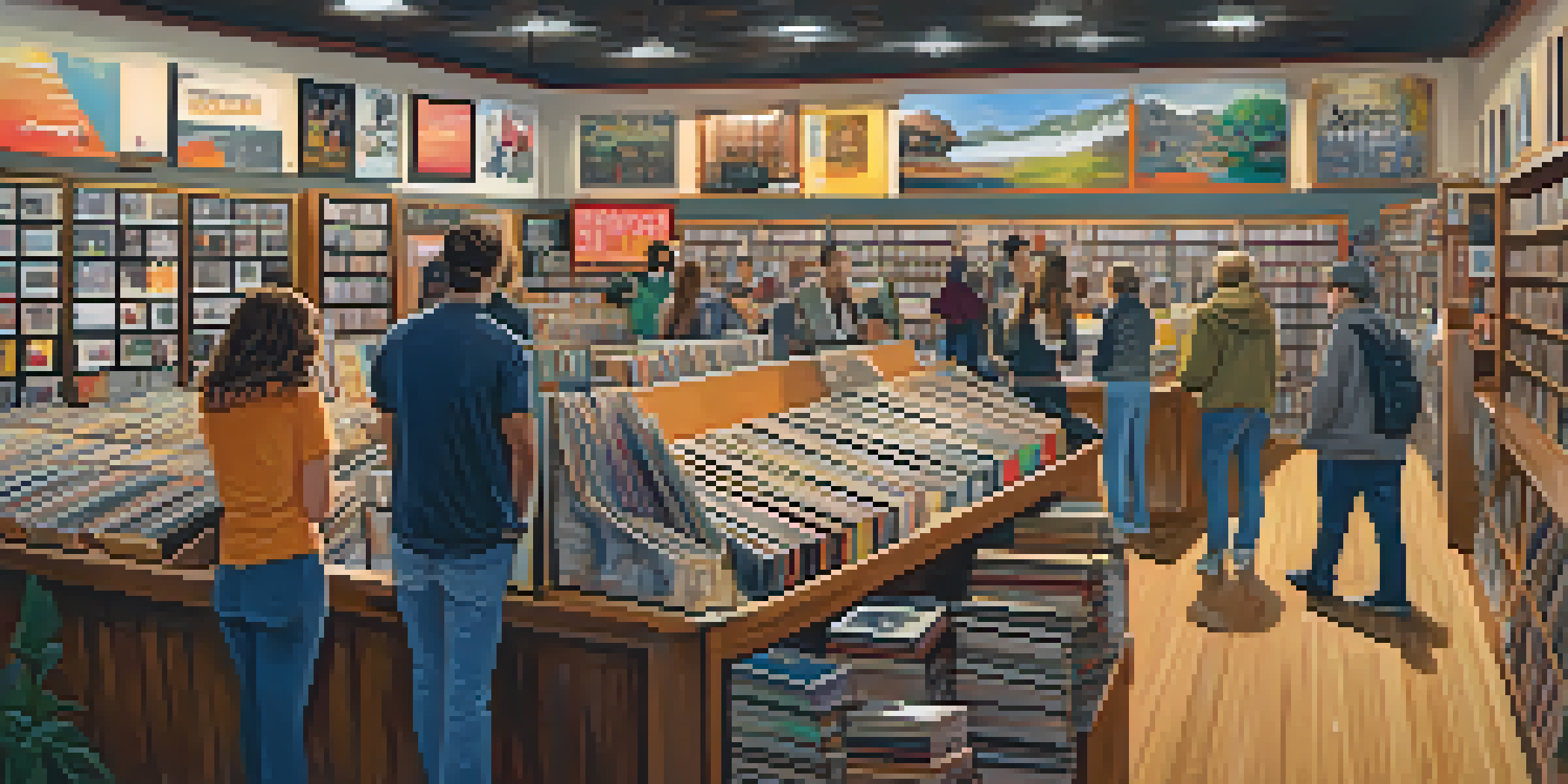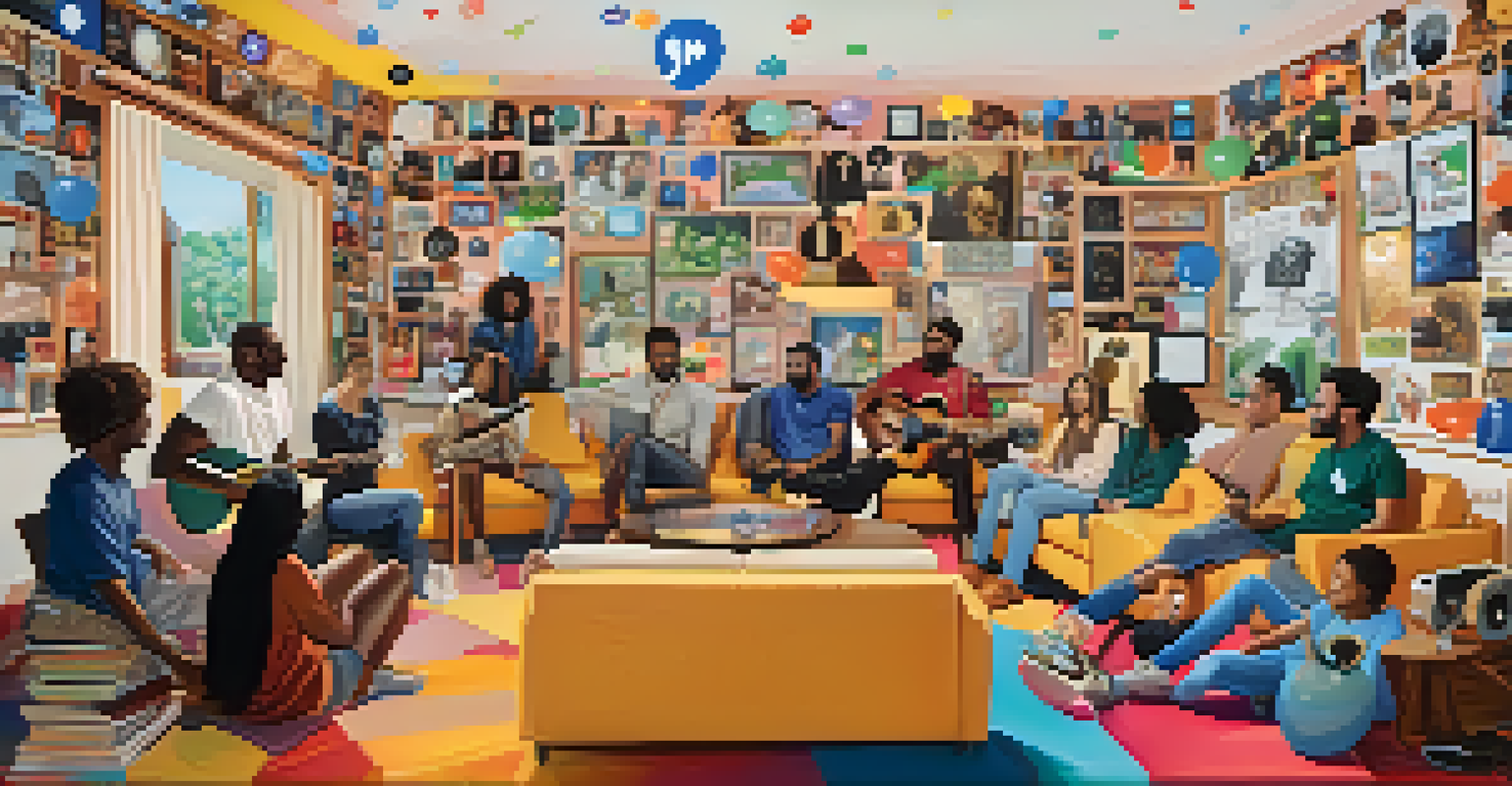Global Access to Music: The Internet's Role Explained

The Evolution of Music Access in the Digital Age
In the past, music access was largely limited by geography and physical media. People relied on local record stores, radio stations, and live performances to discover new music. Fast forward to today, and the digital landscape has completely transformed how we consume music, providing a plethora of options at our fingertips.
Music can change the world because it can change people.
Streaming services like Spotify and Apple Music have emerged as major players, allowing users to access millions of songs from around the world with just a few clicks. This shift has not only expanded the variety of music available to audiences but has also democratized music consumption, making it easier for independent artists to reach a global audience.
As a result, music lovers can now explore diverse genres, cultures, and even underground movements that they might have never encountered before. The internet has truly leveled the playing field, bridging gaps that once seemed insurmountable.
How Streaming Services Changed Music Distribution
Streaming services are at the forefront of the music access revolution, transforming how music is distributed and consumed. Unlike traditional models that relied on album sales, streaming allows artists to earn money based on the number of times their songs are played. This has shifted the focus from selling physical copies to building a loyal listener base.

Additionally, these platforms use algorithms to recommend music tailored to individual tastes, making it easier for listeners to discover new artists and genres. It’s like having a personal DJ who knows your preferences and introduces you to hidden gems.
Streaming Services Revolutionize Access
Streaming platforms like Spotify and Apple Music have transformed music consumption, making millions of songs accessible to listeners worldwide.
However, this model also presents challenges, particularly for smaller artists who may struggle to earn a sustainable income from streaming alone. Despite these hurdles, the overall impact of streaming has been to make music more accessible than ever before.
The Role of Social Media in Music Discovery
Social media has become an essential tool for artists and fans alike, playing a significant role in how music is discovered and shared. Platforms like TikTok and Instagram allow users to share snippets of songs, creating viral trends that can catapult unknown artists into the spotlight almost overnight. It’s a modern-day word-of-mouth phenomenon.
The music industry is a business, but it’s also a culture that thrives on passion and creativity.
For example, a catchy song used in a viral dance challenge can lead to millions of streams, illustrating how powerful social media can be in shaping music trends. This instant access to new music fosters a sense of community, as fans engage with artists directly and share their favorite tracks.
Moreover, social media allows artists to cultivate their brand and connect with their audience, creating a more personal relationship that was difficult to achieve in the past. This dynamic interaction enhances the overall music experience for both the creators and the listeners.
Global Music Collaborations and Cultural Exchange
The internet has facilitated unprecedented global collaborations in music, leading to exciting cultural exchanges. Artists from different countries can now work together seamlessly, blending diverse musical styles and influences. This cross-pollination has birthed new genres, such as reggaeton and K-pop, which have gained massive international followings.
For instance, collaborations like 'Despacito' featuring Luis Fonsi and Justin Bieber exemplify how artists from different backgrounds can come together to create a hit that resonates across cultures. This not only enriches the music landscape but also fosters understanding and appreciation for different cultures.
Social Media Drives Music Discovery
Platforms such as TikTok and Instagram have become vital for music discovery, allowing users to share and promote songs that can quickly go viral.
The accessibility of communication tools allows artists to collaborate from anywhere in the world, breaking down barriers that once existed. As a result, music becomes a vehicle for unity, showcasing the beauty of diversity in a way that transcends borders.
Challenges of Music Piracy and Copyright Issues
While the internet has expanded music access, it has also given rise to challenges such as music piracy. Unauthorized sharing and downloading of music can significantly impact artists' revenues, making it difficult for them to sustain their careers. This issue raises important questions about the value of music and the rights of creators.
Despite efforts to combat piracy through legal measures and digital rights management, many listeners still find ways to access music for free, often at the expense of the artists. This ongoing battle highlights the need for a balance between accessibility and fair compensation for creators.
As the industry evolves, finding innovative solutions to protect artists' rights while maintaining access for fans will be crucial. Education about the importance of supporting artists can help foster a culture that values and respects their work.
The Impact of Music Access on Emerging Markets
Access to music via the internet has had a profound impact on emerging markets, introducing new opportunities for local artists. With streaming platforms reaching audiences in previously underserved regions, artists can now showcase their talent to a global audience without the need for traditional music labels.
This newfound access not only empowers local musicians but also enriches the global music scene with fresh sounds and perspectives. For example, African rhythms and Latin beats are increasingly finding their way into mainstream music, reflecting the rich diversity of global culture.
Global Collaborations Enrich Music
The internet facilitates cross-cultural collaborations among artists, resulting in the creation of new genres and a richer, more diverse music landscape.
Moreover, affordable mobile data plans and smartphones have made it easier for individuals in these markets to engage with music online. As a result, the barriers to entry for both artists and listeners are lower than ever, fostering a vibrant and diverse music ecosystem.
The Future of Global Music Access: What Lies Ahead
Looking ahead, the future of global music access appears promising, with technology continuing to shape how we experience music. Innovations like virtual reality concerts and immersive experiences are redefining live performances, making it possible for fans to attend shows from anywhere in the world. This could further enhance the sense of connection between artists and their audiences.
Moreover, as artificial intelligence becomes more integrated into the music industry, it may provide new tools for artists to create and promote their work. From AI-generated music to personalized playlists, the possibilities are exciting and endless.

However, as we embrace these advancements, it's essential to remain mindful of the challenges that come with them. Balancing innovation with ethical practices will be key to ensuring that the music industry remains fair and sustainable for all.